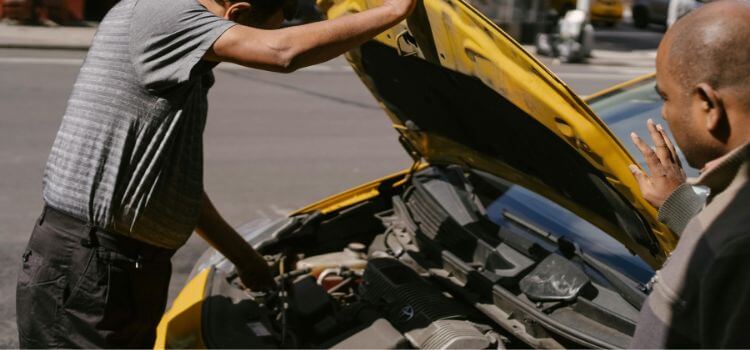To fix a Transmission Over-warning in a Jeep, check the transmission fluid level and condition first. If necessary, replace the fluid and inspect the cooling system for issues.
Dealing with a Transmission Over Temp warning in your Jeep can be daunting, but timely attention can prevent more significant problems. The indicator indicates heated transmission fluid, which could damage the transmission if ignored.
As a critical step, ensure your Jeep’s transmission fluid is filled to the correct level, as low fluid can cause overheating. Regular fluid changes, cooling system leaks, and blockage checks can prevent this issue. Addressing over-temperature alarms protects your Jeep’s complex transmission components, vital to its performance and lifespan.
Table of Contents
ToggleSymptoms Of Transmission Overheating In Jeeps
Jeeps are rugged, but even the most challenging vehicles can succumb to transmission overheating. Symptoms of this issue vary, but recognizing them can save your Jeep transmission from further damage. Below, we’ll explore what to watch for regarding an overheated transmission in your Jeep.
Dashboard Warning Lights
One of the first signs of an overheating transmission is warning lights on your dashboard. Jeeps come equipped with sensors that trigger these lights when issues arise. Specifically, look for a light that reads “transmission over temp” or a general warning indicator.
Unusual Gear Shifts And Delays
- Unexpected gear changes can indicate a problem.
- A delay in gear engagement means there could be overheating at play.
- Transmission slippage, or the feeling that your Jeep is struggling to stay in gear, is another red flag.
Strange Noises Or Smells
Unfamiliar sounds from your Jeep are often associated with transmission issues. Burnt smells indicate transmission fluid overheating and degradation, damaging your Jeep over time.

Common Causes Of Temperature
The ‘Common Causes of Over Temperature’ in a Jeep transmission can stem from a few key issues. It’s a serious matter that requires immediate attention.
Insufficient Fluid Levels
Transmission fluid keeps everything running smoothly. Low levels can lead to overheating. Check for:
- Leaks – Spotting fluid on the ground under the vehicle is a warning sign.
- Dipstick Check – A transmission’s dipstick reveals its fluid level status.
Maintaining proper fluid levels is crucial. Add the recommended type if levels are low.
Faulty Transmission Cooler
The cooler’s job is to maintain the right temperature. Issues to watch out for include:
- Blockages – Dirt or debris can clog the cooler, preventing heat escape.
- Damage – Physical damage to the cooler leads to inefficiency.
Inspect the transmission cooler regularly. Look for signs of damage or blockages.
Damaged Solenoids Or Wiring
The electrical components play a pivotal role. Common electrical issues include:
- Frayed Wires – Wires send signals. Frayed wires disrupt this communication.
- Failed Solenoids – Solenoids control fluid flow. Failure results in overheating.
A professional should examine the wiring and solenoids. Faulty parts must be replaced promptly.
Preventative Maintenance Tips
Keeping your Jeep’s transmission cool and happy is vital to a long vehicle life. Avoid the dreaded ‘Transmission Over Temp’ sign on your dashboard with these essential preventative maintenance measures.
Regular Transmission Fluid Checks
Maintaining the right level of transmission fluid is vital.
Check fluid levels monthly using your dipstick. Look for a cherry-red colour and a sweet smell. A dark colour or a burnt smell requires immediate attention.
Following the steps below ensures accurate measures:
- Ideal temperature: Check when the Jeep is warm.
- Neutral gear: Keep the engine running in neutral.
- Clean dipstick: Wipe it down for a straightforward read.
Scheduled Servicing
Servicing your transmission is as crucial as regular oil changes. Consistent servicing keeps your Jeep away from transmission troubles.
A qualified mechanic will help:
- Change transmission fluid.
- Check for leaks.
- Evaluate transmission health.
Cooler System Upgrades
An upgraded cooling system keeps the transmission at its optimum temperature. It’s beneficial for Jeeps towing heavy loads.
Consider these upgrades:
- Upgrade Benefit
- Auxiliary Cooler Reduces stress on the central Radiator.
- High-Performance Fluid Increases Heat Resistance.
- Better Radiator Enhances overall cooling capacity.
- Invest in a quality cooler system to extend the life of your transmission.
Quick Fixes For Overheating Transmission
An overheating transmission can spell trouble for your Jeep, but quick action can save the day. These fixes target the typical culprits behind excessive heat. They help maintain performance and extend your transmission’s life. Let’s dive right in.
Checking And Topping Fluid Levels
Transmission fluid is the lifeblood of your gear system. Low levels can mean disaster. Follow these steps:
- Locate the transmission dipstick.
- Pull it out and wipe it clean.
- Insert it again and check the level.
- Ensure it sits between the ‘Full’ and ‘Add’ marks.
- If low, add the correct type of transmission fluid.
Cooler Line Inspections
More excellent lines carry fluid to help regulate temps. A block or leak can cause overheating. Perform these checks:
- Examine more excellent lines for damage.
- Look for fluid on the ground where you park.
- Feel for wet spots along the lines.
- Replace damaged or leaking sections immediately.
Overriding The System Temporarily
Sometimes, you need a quick bypass. Remember, this is a temporary fix. Do this to override the system:
| Step | Action |
|---|---|
| 1 | Turn off your Jeep. |
| 2 | Wait for the engine to cool. |
| 3 | Restart and check if the temp normalizes. |
Consult a professional mechanic if problems persist.
When To Seek Professional Help
Sometimes, Jeep transmission issues exceed quick home solutions. The complexities of modern transmissions demand professional attention. If more straightforward steps fail, it’s time to consider expert intervention.
Persistent Overheating Issues
Repeated temperature alerts signal deep-seated problems. Keeping them checked can lead to costly repairs. Signs of persistent overheating include:
- Burning smells from the transmission fluid
- Unusual noises during gear shifts
- Transmission slipping or delayed engagement
A mechanic can identify the root cause and fix it.
Diagnostic Trouble Codes (docs)
These codes are critical for pinpointing issues. A professional tool reads these codes and guides the mechanic. Seeking skilled service is advisable for the correct interpretation and action.
Professional Transmission Flush
Regular maintenance is crucial for transmission longevity. A professional transmission flush replaces old fluid with new, ensuring proper lubrication. This service clears out debris and contaminants. A complete flush requires special equipment and expertise.
| Service | Benefit |
|---|---|
| Professional Flush | Cleans system, refreshes fluid |
Attempt a flush only if you have the required skill set. Otherwise, trust a licensed mechanic to handle the task.
Understanding Warranty And Recalls
When dealing with a ‘Transmission Over Temp’ message in your Jeep, it’s crucial to understand warranty and recall matters. Knowing what’s covered and what the manufacturer has marked lets you fix your car without worry or money.
Jeep Warranty Coverage
A Jeep’s warranty protects against unexpected repair costs, especially for transmission over temp. Let’s dig into the nitty-gritty:
- Basic Warranty: Typically covers your Jeep for three years or 36,000 miles.
- Powertrain Warranty: Offers protection for up to five years or 60,000 miles, which includes the transmission system.
Jeep may provide repairs at no charge if a transmission problem arises within these periods.
Recalls On Transmission Components
Recalls are alerts sent by Jeep to owners when a widespread issue occurs. Check these steps:
- Visit NHTSA or Jeep’s official recall page.
- Enter your Jeep’s VIN.
- Look for any transmission-related recall notices.
If there’s a recall, repairs get made accessible at dealerships.
Leveraging Extended Service Plans
If your Jeep is beyond the essential warranty term, an extended service plan might help. These plans often cover the following:
| Plan Features | Benefits |
|---|---|
| Comprehensive Coverage | Defends against many mechanical failures. |
| Dedicated Transmission Coverage | Focuses on your Jeep’s transmission issues. |
Choose a plan that suits your needs and budget for more peace of mind.
Frequently Asked Questions Of How To Fix Transmission Over Temp Jeep
Check and maintain fluid levels to prevent transmission overheating. Use a transmission cooler. Ensure the transmission is not overloaded and inspect it for any signs of damage or leaks. Regularly service your transmission. If issues persist, seek professional mechanic advice.
To cool down a transmission, ensure proper fluid levels, use an external cooler, avoid excessive towing, and employ regular maintenance checks. Avoid overworking the vehicle and allow for cooldown periods during long drives.
Stop driving and turn off the engine. Allow the transmission to cool down. Check the transmission fluid level. Consult the owner’s manual or seek professional assistance if the issue persists. Regular maintenance can prevent overheating.
Signs of a lousy Jeep transmission include slipping gears, unusual noises, delayed shifting, fluid leaks, and warning lights on the dashboard. Check for these symptoms to assess transmission health.
Conclusion: How to Fix Transmission Over Temp Jeep
Addressing a transmission overheating issue in your Jeep can feel daunting. Yet, tackling it step by step restores performance and longevity. Remember, regular maintenance is vital in preventing such problems. Should you face this challenge again, revisit these tips for a swift, effective solution.
Keep driving safely!











